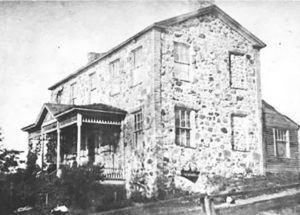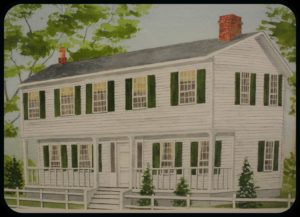Family of Moses Allen and Chloe Ward: Part one of the Early History of Allens Hill
by Joy Lewis –
Moses Allen (1739-c. 1801) and his wife Chloe Ward (1744-c. 1804) were the parents of eight children. In 1796 many of those children were young adults. That year Moses and Chloe relocated their family from Dutchess County, New York, to the western reaches of the state to the township then known as Pittstown (today, Richmond). Some of their children came with them.
Daughter Caty was in her early thirties, married to Roswell Turner, and the mother of five youngsters. In their first winter in Ontario County the two oldest children, a boy and a girl in their early teens, succumbed to fever. The Turner family and their neighbors endured many hardships. Chloe Turner, Caty’s daughter, later recalled some of those early experiences:

“It was in the summer of 1802 that a little daughter of one of our neighbors, Sewell Boyd, three years old, was lost in the woods. A lively sympathy was created in the neighborhood, the woods were scoured, the outlet waded, and the flood wood removed; on the third day she was found in the woods alive… In the earliest years, deer would come in flocks and feed upon our green wheat. Elisha Pratt, who was a hunter, made his home at our house, and I have known him to kill six or seven in a day. Bears would come and take the hogs from directly before the doors of the new settlers, sometimes in open day light. I saw one who had seized a valuable sow belonging to Peter Allen [Caty’s brother], and retreated to the woods, raising her with his paws clenched in her spine, and beating her against a tree to deprive her of life; persisting even after men had approached and were attacking him with clubs.”
In the decade during which Caty and Roswell lived in Pittstown, three more children were born to them. Their son Orsamus arrived on July 23, 1801, one of the first white children born in the town. The family moved westward to Wyoming County when the boy was three years old. And four decades later, never having forgotten the stories of his parents and older siblings about the territory’s early years, Orsamus, now a newspaper editor, produced two important volumes: Pioneer History of the Holland Purchase of Western New York (1846) and Pioneer History of Phelps and Gorham’s Purchase (1851).
Another child of Moses and Chloe was Peter Allen, twenty-one in 1796 when he came with his family to Pittstown. Later that autumn he returned briefly to Dutchess County to marry Polly Peterson. The newlywed couple had a log home on the same property as Peter’s parents. Here, over the course of seventeen years, were born nine children: four sons and five daughters.
During the War of 1812 Peter served honorably as a commander in the Ontario County Militia; at the Battle of Queenston he was taken prisoner by the British. Released after some months, he returned home to his family where he began construction on a new frame house. The house, however, was yet unfinished when Peter, Polly, and their progeny pulled up stakes and moved westward.
They came to rest in Vigo County, Indiana, where they were the first settlers of what eventually became the city of Terre Haute. In 2016 Terre Haute celebrated their bicentennial. As a commemoration of their early days, the city gifted the town of Richmond with a framed certificate recognizing the contribution of Peter Allen to their settlement. This document remains on view in the office of the Richmond Town Supervisor.

The youngest son of Moses and Chloe Allen was Nathaniel. At age sixteen, he and his younger sister Clara, were the only Allen children still living at home. Nathaniel was a blacksmith working a forge near his home that belonged to their neighbor Captain Peter Pitts. A frugal young man, Nathaniel saved his money and bought for himself a bit of property – several acres atop the hill north of his family home.
Here he built a brick forge and went to work on his own behalf. This earliest building in the community that later bore the Allen name was located near the northwest corner of the present-day intersection of Allens Hill Road and Belcher Road. Within a few years Nathaniel married, taking as bride the nineteen-year-old daughter of David Akin, Elizabeth. For four or five years the couple lived in a log house near the blacksmith shop until their luxurious hilltop home was completed in 1805.
During the War of 1812 Nathaniel, then thirty-two years old and the father of six living children, served in the Ontario County Militia. Awarded the rank of Major, he was the paymaster for his regiment. Returned from the war, he was elected sheriff of Ontario County, and later served two terms in the state legislature. He was a man well-respected in his community, as John Nicholas Norton wrote in Allerton Parish: “That is Major [Allen] and his family, who are crossing the street, from the handsome farm-house almost hidden by the orchard. He is a sort of lord of the manor: a fine, portly, well-mannered man, once a blacksmith, then, rising by his energy and business qualities to the dignity of sheriff; [an industrious man, ever] adding something to the increasing wealth which enabled him to purchase his valuable estate.”
His oldest daughter Almira was born in 1803. Eighteen years later she married Robert Lawson Rose, of Geneva. Her father gifted them with a hundred acres on which they built a stone house. About a century later the Bonjourno family lived in this house; son Joseph left a written description: “The house was a picturesque stone house. It was set back about 100 feet from the road. The driveway was lined with birch trees. The window sills were about 1½ feet wide and easy to sit on. It had a big living room, huge kitchen with a bedroom downstairs and 3 bedrooms upstairs. There was a big woodshed in back [and] a cistern for water.” (The house was destroyed by fire in 1922. Today this property on Allens Hill Road is the George B. Taylor Memorial Park.)
Almira and Robert lived here only a short time, however. In 1828 her father Nathaniel went bankrupt. Two years later Robert Rose paid $10,000 to bail out his father-in-law. In compensation he moved his family, now including three young sons, into the Allen home atop the hill. Some time later Mr. Rose was elected to the U.S. Congress and his home was known for many years thereafter as “The Congressman’s House.”
Though Nathaniel Allen was no longer the richest man in the area, he was nevertheless well-thought-of by his neighbors, and in the year after his unfortunate financial troubles the community’s Post Office was named in his honor. Since 1811 there had been a Post Office in the neighborhood, first called “Honeoye” (which was then the township’s name), then called “Richmond” after 1815 when the town’s name was again changed. In 1829 the name of this Post Office was changed to Allen’s Hill. In 1894 the spelling was altered when official postal decree mandated the removal of punctuation from the names of all post offices. Today it is correct to write “Allens Hill.”
The name of the community, however it is now spelled, endures as a fitting legacy to Nathaniel Allen and his family.